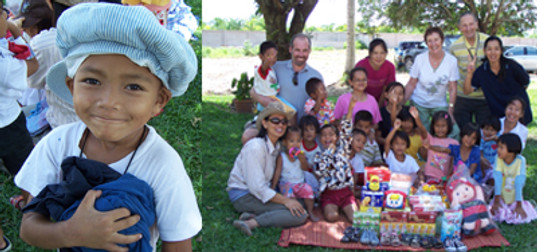Our Projects
In the past 15 years, "Stop Poverty"; has launched or supported various projects. These projects were deployed in numerous developing countries such as India, Thailand, Indonesia and North Africa.
Donations &
Experiences
Yogyakarta, Indonesia
Merapi volcano in Yogyakarta Indonesia. Frightened residents in the active city of Yogyakarta, population 400,000, at the foot of the mountain and volcano Merapi rumbled several times, with residents boarding buses and trains to find shelter with family and friends in distant cities. Concerns about ash clouds caused many international airlines to cancel flights to the capital Jakarta. This came just days before former US President Barack Obama was scheduled to visit Indonesia. Merapi volcano, one of the world's most active volcanoes, has erupted many times over the past 100 years, claiming more than 1,400 victims. But the eruption in November, was the most tragic so far since 1930, claiming over 100 lives. The city of Yogyakarta was placed on the highest alert, the city serving as a conduit for the deadly streams of lava and mud, supported by heavy rains, which reached speeds of 100 km/h and destroyed everything in their path. By this time, a thick layer of volcanic mud had already flooded a quarter of the nearby river and was rising by the hour. Nearly 280,000 people living on the slopes of the volcano were housed in emergency shelters - many without the ability to wash or use the toilet.

Education for mountain children, India
Education is a vital key to combating extreme poverty and providing a way out for the affected children. Through this programme, the children are provided with special attention and the problem of dropouts in schools is minimised, also slower students are given adequate support to get the opportunity to improve subject knowledge. The project benefits tribal children from 16 tribal villages of the Palanimalai Hills region who have been victims of violence, orphaned, rejected or neglected by parents and have never known intact family structures in the form of love and warmth. Each of these families will receive a goat which will provide them with economic support and security, similar to the Nobel Prize winning Micro Credit project. Following the project, the families will be able to partially finance themselves.
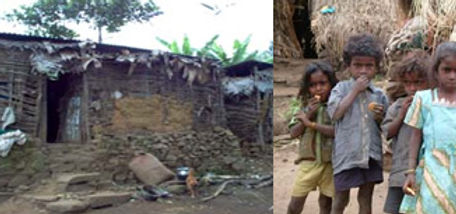
Project "Mini Van", Thailand
The Father Ray Children's Village, based on the concept of SOS Children's Villages, opened its doors in early 2008 with the aim of providing a home for poor, destitute, abused and abandoned children. In the Village, the children live together with other children in what we consider a normal family environment. The children are supported and cared for by specially trained staff. With the help of this environment, the children are offered a perspective that provides space for personal development and family support. Since the beginning of the project, 26 children have moved into their new home, of which 22 have already been placed in various schools. In 2008, four houses were already built, followed by another four houses in 2009 to provide a home for another 26-30 children. At the moment there is only one van for the whole foundation, another vehicle would make it much easier to travel back and forth to the surrounding schools.

Medicines, Africa
Leishmaniasis is rampant in many countries in Africa, which means that the people - most of them nomads - are infested with sand fleas during the summer months. Since suitable hygiene and medication are simply too expensive, an acquaintance from Morocco asked Michel for help. The company Adtension GmbH immediately donated 200 Euros, which we were able to hand over in May 2012. Due to the heat, the medicines will only be bought and administered in late summer. On this day we were able to bring a lot of joy. Many thanks again to Adtension GmbH from Cologne for the donation.
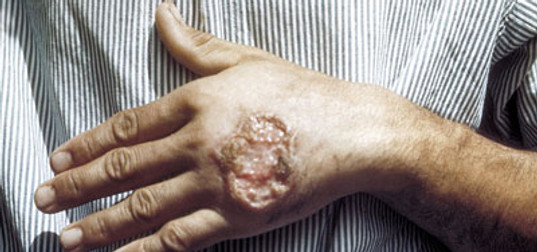
Donations after volcanic eruption, Indonesia
After the volcanic eruption in October 2010 on the island of Java, the patron for Indonesia asked us if Armut Bekämpfen.de could possibly collect money for the victims. After a few emails, Gameduell agreed to donate something, unfortunately the Christmas donation was already planned elsewhere, but for January 2011 it could work out and so it did. From Bali we flew to Yogjakarta on Java, home of one of the seven wonders of the world because of the Bodobudur temple and visited one of many refugee camps - many thousands are homeless and have lost everything. In some places, whole villages are buried under the ash, some up to twenty metres high. The refugee camps were provided by Lions Club Java, among others, as well as food and clothing for about one thousand people. The donation from Gameduell was invested in school bags/backpacks, shoes and school uniforms - first of all for about 200 children, the rest of the money was used to support other children in other refugee camps in a similar way.
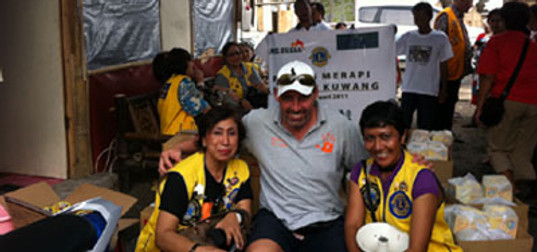
Playground, Thailand
The playground had been planned for a long time, but unfortunately there was no budget available for the 120 children of the kindergarten. The originally planned playground was sold and only available again after 3 months. The emergency solution was a display piece for € 7,000 with a 50% discount, as the colour had already faded a little in the sun. The construction took place on a Friday, all day long, at about 39 degrees Celsius. The inauguration took place on Saturday in the presence of Pattaya TV, Pattaya Newspaper as well as the responsible persons of the Father Ray Foundation and the children who were so happy.

Skate Park, Afghanistan
Karokh is a suburb of Kabul. In cooperation with the foundation of one of our patrons, Titus Dittmann (www.skate-aid.org) and Dr. Rupert Neudeck (co-founder and chairman of the international peace corps Grünhelme e. V., www.gruenhelme.de), the first concrete skate park / skateboard track in Central Asia was built for 7,500 pupils at a school in Karokh, Afghansitan. The planning was done by the owner of www.betonlandschaften.de / landscape architects Ralf Maier.

Visit orphanages, Vietnam
Originally, the orphanages Xom Chieu Orphanage and An Lac in Saigon were to be visited, but since Mr. Thai Son Vu, owner of Long Son Ltd, recommended that Michael visit orphanages outside the city centre of Ho Chi Minh City / Saigon, the plan changed. Most of Mr. Vu's staff come from similar institutions, so he supported us with his personal driver, as well as a field worker from one of the three orphanages, who acted as an interpreter. Orphanages and similar institutions in Vietnam are only financially supported and promoted if they are close to the city; institutions outside the centre do not receive any support. As we at Poverty Alleviation like to help where the need is greatest, we accepted the recommendation to visit orphanages outside the city centre of Ho Chi Minh City / Saigon.
In addition to donations in kind in the form of toys, stuffed animals, clothes, shoes or similar items, we help on site with urgently needed daily necessities. Before visiting the orphanages, we bought milk, powdered milk (for toddlers and babies), soap, shower gel, toothpaste, toothbrushes, soup, biscuits and detergent for 1.2 million Dong (Vietnamese currency) / approx. 120 Euros.
The first institution we visited was the Linh Son Monastery, which could only be found with local help. The institution supports and promotes mentally handicapped children, who are hidden by their families in Vietnam under normal circumstances. The ladies / housemothers of the facility were completely surprised by our unexpected visit and were very happy about the food. The children, on the other hand, who have been abandoned by their parents (in the local belief this is a consequence of bad karma from a previous life) and own nothing except the clothes they have, were so happy about the stuffed animals, T-shirts and shoes that it was hard to believe..... Especially when you compare this with the consumer behaviour of children of the same age in Germany. In our photo gallery, you can see under which circumstances the children in Linh Son Monastery live.
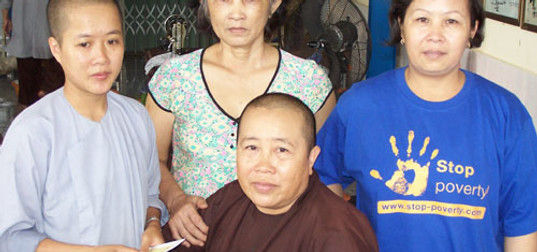
Chua Tien Phuoc Orphanage, Vietnam
The second institution was "Chua Tien Phuoc", which is supported by UNILEVER with food and technical means. The orphanage was very small, the school was in the house opposite, where the older children were taught on the computer, among other things. We showed up for lunch and the children were surprised by our visit and shyly and delightedly awaited our gifts in the form of clothes, toys and food. Babies were also cared for here (see pictures). A mentally handicapped child in the playpen was fed and was completely apathetic, one of the women kept saying "Baby Mad, Baby Mad", meaning the child is crazy. Michel gave the child a stuffed animal in the shape of a bear with a chef's uniform and after a while the child laughed and was happy that someone was dealing with him.
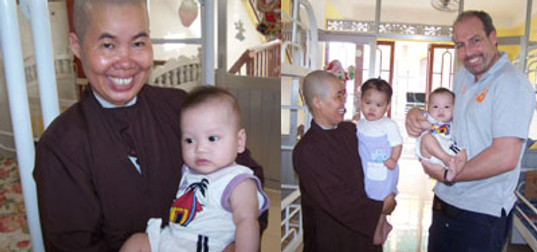
Visit orphanages, Vietnam
The third and last establishment we visited that day was the "Khanh Tam Open House". It should be noted, however, that the road conditions and traffic are somewhat "different" than in Europe. Our trip to the orphanages started and ended in Ho Chi Minh City / Saigon, we drove about 100 km and were on the road for almost 12 hours. This institution also primarily cares for orphans and mentally handicapped children. As we couldn't find the orphanage directly, we called there and were welcomed with a welcome song... Here, too, we handed over toys, clothes as well as food and they didn't want to let us go - a very nice experience. As Michel appeared unshaven and with a sack / bag full of toys, many children thought he was Father Christmas and sang a Christmas carol - can you believe it?
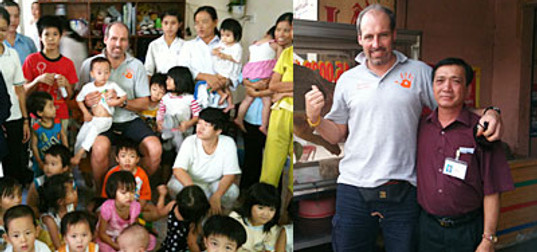
Father Ray Foundation, Thailand
On his second visit to the Father Ray Foundation in Pattaya, Chonburi Province Thailand, Michel saw tremendous progress at "The Village" (an SOS Children's Village-like facility). Many of the children recognised Michel from his first visit in 2008 and the reception was magnificent. Of course, the children were also delighted with the stuffed animals, food and clothes they brought with them. During our visit to the village, we discovered that four more houses had been built since Michel's last visit, in addition to the four already existing houses. These were nearing completion and we were invited to the grand opening ceremony - unfortunately Michel was already on his way back at that time. Donors and investors are welcome to take over the sponsorship for such a house; houses of this kind for six to eight children incl. "House Mommy" including all facilities (sanitary, furniture, etc.) are possible for about 20,000 Euros.

Father Ray Foundation, Pataya
He was already familiar with the foundation due to Michel's professional activities in Thailand (2005 - 2006). Father Ray Brennan built a large foundation from nothing, which consists of "The Village", "Drop In Center", "Day Care Center", "School for Blind Children", "Childrens Home", "Home for Street Kids" and the "Handicapped School".
Father Ray passed away in 2005 but his legacy is carried on by a multitude of supporters. Brother Dennis, the head of the institution, was formerly one of the leading IBM programmers in Canada; he gave up this promising career and now runs the "Fr. Ray Foundation" with great success. A large team of volunteers (including German volunteers doing a social year) from all over the world help and support the foundation. They receive free board and lodging and actively help in all projects 6 days a week and teach the children e.g. English. Furthermore, the foundation is supported by various social workers of the city of Pataya, who find children from the slum areas (27 official ones in Pataya alone), support them and bring them into the home after consultation with the often overburdened parents.

Orphanage, Thailand
Currently, about 80 children between the ages of 3 and 15 live in the village. The project was founded by Europeans living in Thailand after the tsunami disaster in 2004. With their help and the support of the Thai government, a plot of land was purchased on which a complete orphanage with individual houses was built. This model is based on the international SOS Children's Villages, as is the case with the Father Ray Foundation in Pataya. The facility was built by the French Red Cross and financed with donations. Everything is in a new and immaculate condition. Monetary donations to purchase food and learning materials such as books or computers are of course always welcome.

Orphanage, Indonesia
This orphanage is run by nuns of the Franciscan order. The orphanage in Indonesia differs significantly from other orphanages because it is Christian-run and not Muslim. Like the state institutions, it does not receive any support or funding. Consequently, this institution can only be maintained through donations in kind and financial support. Approximately 100 young girls and boys are cared for at any one time without being judged by their religion, and even children over 17 are not simply turned away after their time, as is usually the case in other Christian institutions. On the contrary, the nuns are happy to have any happy person under their roof. The children range in age from 3 years old to young adults and everyone helps out.
Children from all parts of Indonesia are sent to Bali from the local Christian Franciscan communities where poverty is even greater, such as Java, Jakarta, Timor, Surabaya or Flores. If you are in Bali, please stop by. Clothes, school supplies like pencils or paper are always welcome. You will be surprised to find children in a good mood and happy and how much they can appreciate stuffed animals, a T-shirt or even crayons.
Address :
Bali Franciscan Orphanage
Tuka Indonesian: Panti Asuhan Katolik Jln Raya Tuka Desa Tuka Bngr Dalung Bali Indonesia November 200
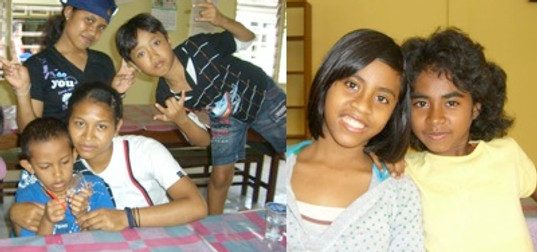
Drop In Center, Thailand
The "Drop In Centre" can be compared to a youth centre. Many rural children run away from home and follow the lights of big cities like Bangkok, Pukhet or Pattaya. Television suggests these cities to them, as places of fun and happiness. Some spend months on the road and realise when they arrive that they can't have fun there without money. Since they have no home, the only option left is drug dealing or prostitution. The "Drop In Centre" offers the children a place where they can sleep, attend school and receive medical treatment. Living on the streets, many children have skin and chest infections, injuries from gang wars and of course sexually transmitted diseases.
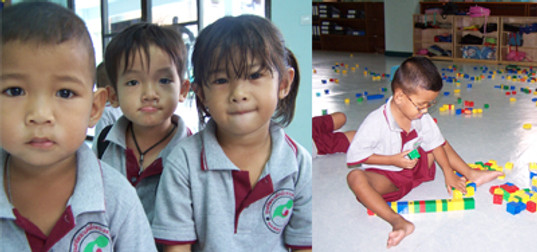
Street Kid Home, Thailand
This is where the journey ends for many children after an odyssey and a life on the streets, as described above, many think that life is easier in big cities than in the countryside, where many end up selling their bodies to survive. The "Street Kid Home" has existed since 2005 and has space for 400 children, many of whom quickly disappear again because they are not used to following rules. Here too, the Father Ray Foundation tries to provide an environment that offers family structures and such an environment, even if this is not always successful.
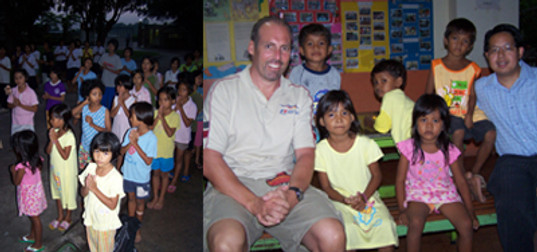
Father Ray School For Blind Children
The school for the blind in Pattaya is also very special, as there is nothing else like it; the school has existed since 1986 and serves as a primary and secondary school for blind and nearly blind children. Besides schooling, the children are taught all the skills for an independent / self-reliant life. The school is under the patronage of Her Majesty Princess Maha Chakri Sirindhorn, who visited the school in 1986 and 2007. So far, more than 400 students have graduated from this school. As computer skills are essential in any job nowadays, the children are taught Braille on computers and Thai and English are also taught. There are classes from kindergarten to grade 9, and some go on to "normal" schools and graduate from grade 12.

The Village
The Village is run under similar circumstances and structures as SOS Children's Villages; it is a place where orphans, abandoned children and children in difficult circumstances feel they have a home and a family. Competent and trained mothers and volunteers and social workers, give the children a sense of security, love, inspiration, support and encouragement, which helps and encourages them to take a place in society.
